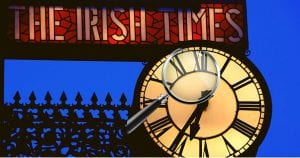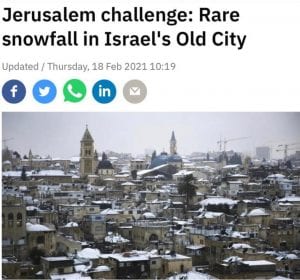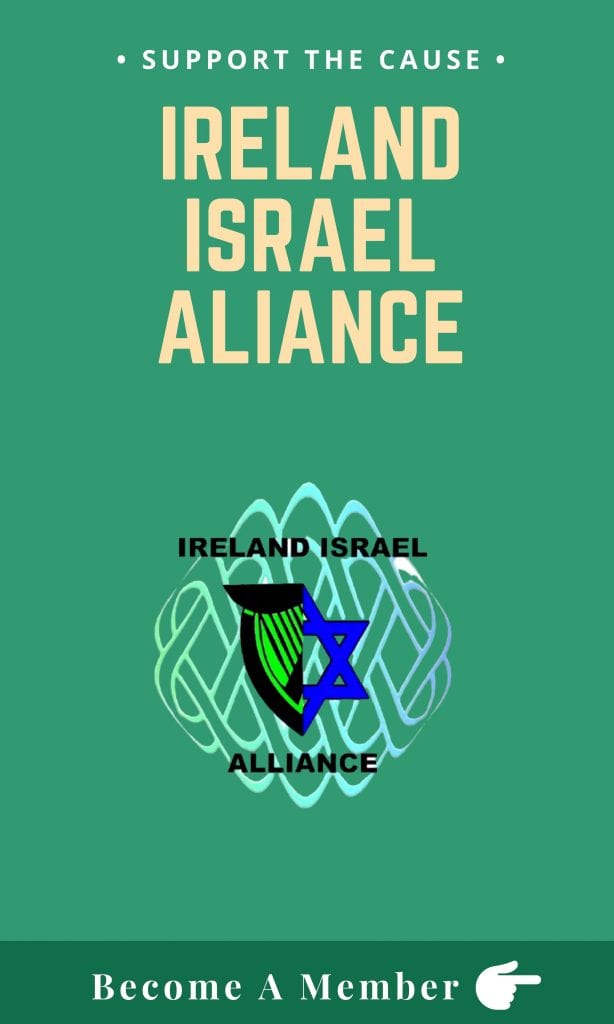UN General Assembly votes to establish Jewish & Arab states in British Mandate Palestine, 29 November 1947
Ten years ago, the Arabic word Nakba (‘catastrophe’) was hardly known outside intimate circles of pro-Palestinian activists. Today, it is everywhere in use as a weapon in the armoury of those who exploit the unresolved Palestinian issue to demonise the state of Israel. It is seen and heard in Western media headlines and on the lips of political leaders.
Jews say Yes, Arabs say No
The 57 member states of the UN General Assembly voted on 29 November 1947 to partition former British Mandate Palestine into two states of roughly equal size, one Jewish, one Arab, with the Jerusalem-Bethlehem area to be a separate internationally administered enclave. The vote on Resolution 181 was 33 in favour, 13 against with 10 abstentions and one absence.
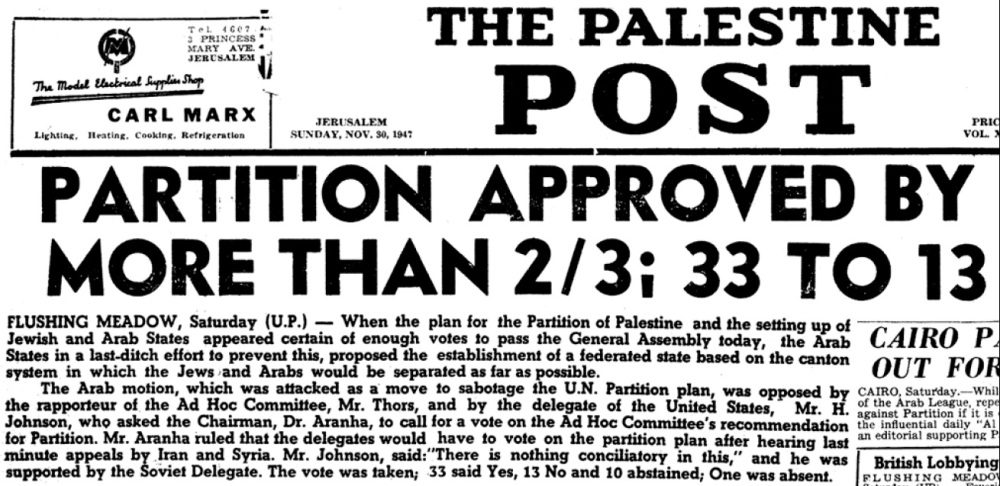

Twenty-five years earlier, the original League of Nations ‘Mandate for Palestine’ had been divided along the Jordan river by the British Government; the eastern part, comprising 77 per cent of the total area, had gone to form the Arab Kingdom of Transjordan (now Jordan) from which Jewish settlement was excluded.
Now the remaining 23 per cent was to be divided in half, placing many of the historic and religious sites of the ancient Jewish kingdoms beyond the borders of the new state. Notwithstanding these disappointments, the dominant mood among the Jewish population was one of apprehensive acceptance, but also of jubilation: the 2,000-year-old dream of being ‘a free people in our own land’ was close to realisation.
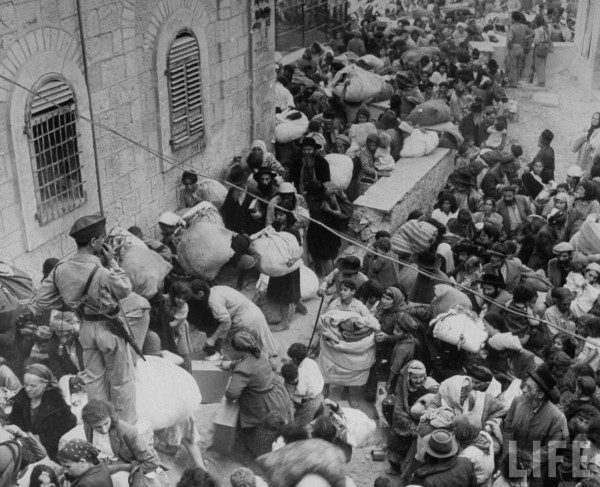

Tragically for both sides, however, the reaction of the Arab leadership, local and external, was exactly the opposite. In 1937, a British proposal for a tiny Jewish enclave on less than 20 per cent of the land had met with outright Arab rejection and a bloody revolt, indicating that any self-governing Jewish entity, of whatever size, alongside an Arab state was anathema. That rejectionism was even stronger in 1947.
In October, Azzam Pasha, General Secretary of the Arab League, had told an Egyptian newspaper: “Personally I hope the Jews do not force us into this war because it will be a war of elimination and it will be a dangerous massacre which history will record similarly to the Mongol massacre or the wars of the Crusades.” (1) He told the British diplomat Alec Kirkbride “We will sweep them [the Jews] into the sea.” (2)
Jubilation turns to tragedy
The Israeli novelist Amos Oz describes the atmosphere in the Jewish communities and the fateful portents of the night of 29-30 November as the news came through from New York:
“… but one in every hundred men, women, old folk, children and babies in those crowds of Jews who were dancing, revelling, drinking and weeping for joy, fully one per cent of the excited people who spilt out on to the streets that night, would die in the war that the Arabs started within seven hours of the General Assembly’s decision…” (3)
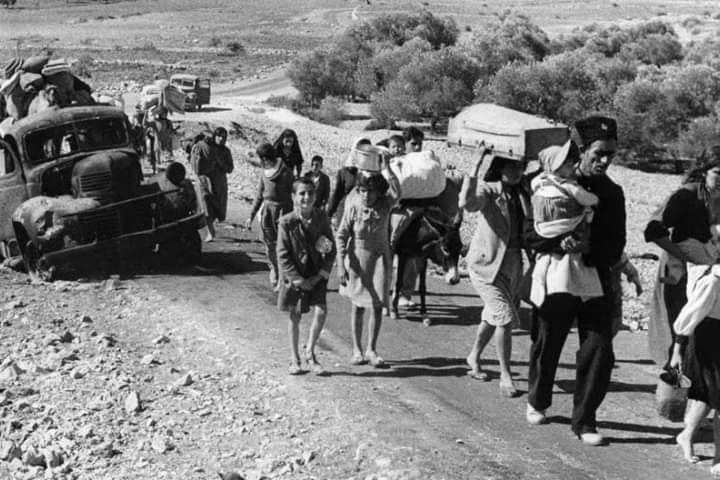

The attempt to make good on the genocidal threats began immediately. In the sixteen months of war that followed, almost one per cent of the Jewish population (6,000 of 650,000 people) indeed lost their lives as their armed forces fought back, first against three irregular Arab militias and then, after Israel’s Declaration of Independence in May 1948, against invading armies of six neighbouring Arab states. (Compare a native death toll fifty times smaller, or 0.02 per cent, in Ireland’s war of independence.)
The Great Nakba Rewrite
The rest is history… or used to be, until the Great Nakba Rewrite took effect. Millions have now been sold the propaganda lie that nascent Israel embarked on a deliberate mass expulsion of 650,000 Palestinian Arabs. But the record shows that the vast majority of the Arab refugees were not expelled by Jewish forces.
First to leave in the early months of 1948 were about 100,000 members of the Arab elite. Soon after, throughout Palestine, local Arab leaders advised or ordered the evacuation of women and children or whole communities, either to avoid the fighting or in the expectation of an early return with victorious Arab forces. It is true that, at several locations of heavy fighting, Jewish forces did expel Arab communities, but these formed less than 10 per cent of those who fled.
For example, during the fighting around Nazareth, soon-to-be prime minister David Ben Gurion specifically instructed his forces not to expel the Arab residents. In Haifa, when the city was captured by the Jewish Haganah on 22 April, the 70,000 Arab residents decided to leave rather than accept the terms of surrender. Shabtai Levy, the city’s first Jewish mayor, and British Maj.-Gen. Hugh Stockwell pleaded with them to stay as free and equal citizens, but in vain. (4)
Meanwhile, in Jerusalem’s Old City, the Jordanian Arab Legion was busy expelling the entire Jewish population from the Jewish Quarter and blowing up all the synagogues there. (5)
International law and UNGA 181
Leaving the truth about the Nakba aside, there is another important reason for setting the record straight on the events of November 1947. The fact that no Arab state emerged in Mandate Palestine, thanks to the Arabs’ own refusal, means that the state of Israel, under the universally upheld international law principle of Uti Possidetis Juris – the foundation of the legality of international borders – was the only sovereign entity that could inherit the boundaries of the British Mandate territory.
Telling the truth has salutary effects. In this case, the truth about UNGA Resolution 181 and its aftermath brings an entire house of cards of anti-Israel narrative tumbling down.
By Dermot Meleady
References
- Akhbar el-Youm (Cairo), 11 Oct. 1947.
- Benny Morris, 1948: The First Arab-Israeli War (Yale Univ. Press, 2008), p. 187.
- Amos Oz, A Tale of Love and Darkness (2002).
- Morris, 1948, p. 145-7.
- Ibid., p. 217-19;Martin Gilbert, The Routledge Atlas of the Arab-Israeli Conflict (7th ed., 2002), p. 46.

